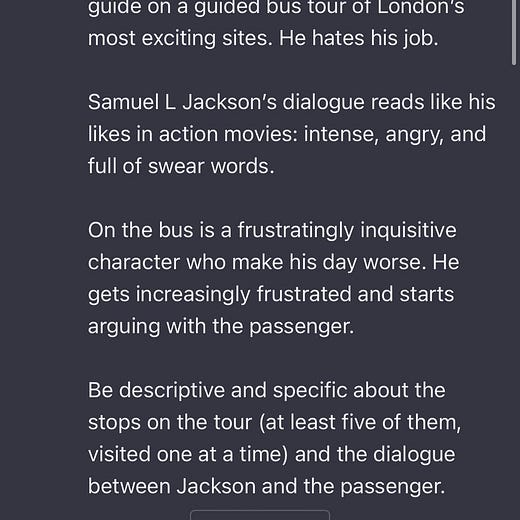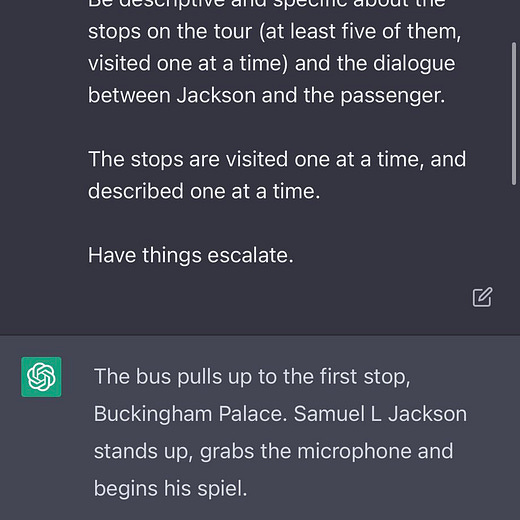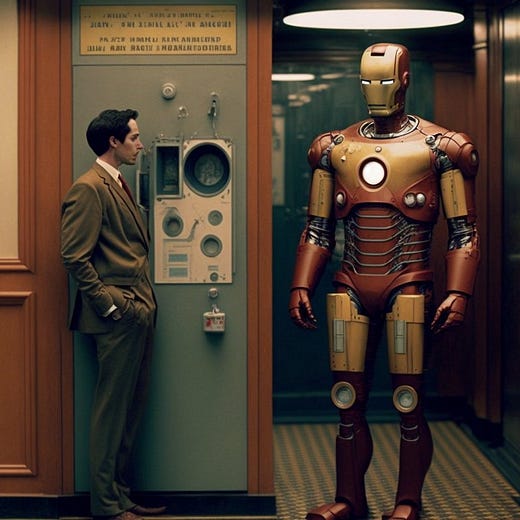Writing In The Age of AI
GPT-3 already changed the game. Now ChatGPT is sending us to the moon, as my dear crypto bros would say (what happened to web3?)
Note: You’ve surely read countless hot takes on the new chatGPT. And I’m sure you’re wondering where the AI writing tutorials are. They’re coming. But here’s a very important, critical message that you can’t afford ignore:
I’ve been using GPT-3 for all kinds of writing since it was first released in 2020.
What took me maybe 4-6 prompts to get right with GPT-3, now takes me 1 prompt with chatGPT.
Any additional prompts after the first one is only to continue the “conversation” and get more ideas, angles, thoughts, and text.
My writing process used to include several iterations, revisions, and editing.
Now that has been shortened by at least 4 steps.
Overall, my process for how to leverage AI for writing (and thinking) remains the same.
But now I’m getting far better output, faster.
I mean, have you seen what chatGPT can do?
All of this from Joel Klettke is hilarious:
(He’s got a bunch of these, please make sure you follow him).
Get a marketing plan done for you in seconds:
You can also get code written for you:
The range of possibilities is as wide and endless as there are humans:
When you think about tools and the value they create, you need to ask yourself:
“What use case does this unlock?” as well as “what problem does this solve?”
Here’s what it all means for writing
It would be premature to have the complete picture.
It’s so early.
And yet, it’s too late. Anyone jumping on the bandwagon now is years behind—and everything is accelerating.
I’m barely keeping up, and I’ve been using generative AI (and for quantitative work) for 3 years.
So, the answer is to not keep up with daily or even weekly changes.
You have a window of ~12 months to find your bearings, try things out, and figure out how to leverage AI for whatever you do.
Instead of diving into the daily flow of updates, releases, new tools, new this, new that, and everyone doing everything, all at once…
Slow down.
Change your perspective.
When everyone can write anything, at any time…
Your surfboard for this tsunami-level extinction event is not to offer, say, “content marketing with the help of AI”.
Anyone can offer the exact same article writing as you, using the exact same AI writing tool as you, and getting it done as fast as you.
Differentiating with AI alone could be done up until a few weeks ago. Now it’s not good enough.
Same goes for any writing: fiction, poetry, non-fiction, Facebook ads, emails, landing pages, novels, and all of it.
The novelty of “done with AI” will wear off.
As amazing as AI and chatGPT is (and it is), your advantage is NOT:
Your Thing + AI
It's:
Your Thing + AI + Your Perspective, Taste, Imagination
When everyone has access to AI, like now, AI alone is no longer the advantage.
For sure, you can sell something with AI to markets that are clueless, lagging behind, or have little to no interest in doing things with AI.
But a lasting advantage?
Being fully human is the true unfair advantage.
And now is the time to engage with AI in a way that protects and harnesses us, as we are.
The risk is unimaginable. Things can go very wrong, very quickly. And inadvertently, AI can end up exercising a level of control and domination that no one in their right mind would want.
But the possibilities are also unimaginable. But if you engage with AI with the right mindset and goal, where ultimately you’re looking for human flourishing…
Things become a lot clearer.
You need to feel both the sheer terror and the exuberant thrill of what’s possible with AI.
You need to see what could go wrong and what could go right.
And when you do, that emotional energy pounding in your chest can lift you up and forwards, with a spring in your step that might’ve been missing for years.
The future is now. It’s wide open.
For writing, here’s a first draft of what I’m thinking.
First draft: Writing in the Age of AI
The writing (and creative) process is the evolution of an idea into its final form through a progression of thoughts and actions. AI can augment, enhance, and expand what you do at every stage.
AI is a co-writer, collaborator, and creative assistant.
The way humans write (and do any creative work) is both different and similar.
AI and GPT-3 creates new content based on patterns and themes in existing works, which isn’t so different from the way that humans engage in creativity.
Even the most innovative writers usually have a solid grounding in the tenets, theory and predecessors of their chosen form, whether it be classical piano or creative fiction writing.
Building on what comes before, consuming and acquiring “input” is a key part of our creative process.
We have higher executive functions that allow us to exhibit reasoning, planning, cognitive flexibility, and problem-solving.
We also have lower-order emotions that allow us to have opinions and care about one idea over another, one word over another, not just as the output of a probability function.
Should AI behave in the way we want or the way their creators intended? Whose values align these systems? Should you have access to the full range of human expression, ranging from hate to love, and everything in between? I say yes. Otherwise, we’ll be reduced, marginalized, and cut down.
AI can be an amazing improvisation partner. It’s an endless stream of “yes-and” and “no-but”.
Any well-read person knows it is possible to fake intelligence by sounding intelligent. AI sounds intelligent. It’s not intelligent in the way we think of intelligence. But if you’re reading a well-reasoned argument, or converse with a bot without knowing it—does it make a difference?
Is the only thing we’ve got left that AI can’t copy our personality? You could train an AI on personality tests—and your personality. But will it ever be able to be you, or will it always just replicate you, in various instances? Does it matter?
What’s in you, that makes you, you?
What does “you” look like, fully alive?
If you were to write out “you”, what would I read?
As AI systems become as good as humans at knowledge and writing tasks, you need to explore the illegible, the irrational, and the emotional.
If AI turns mediocre writing into a commodity, will that increase the "price" of good writing?
But do we pay for “writing” or for what we experience when reading?
Handmade things are appreciated more once you can get cheap replicas or imitations.
Will we compliment a piece of writing by saying "this couldn't have been written by an AI"?
If AI can generate an endless stream of ideas, will it still be about the “idea” in what you’re reading?
Does it not matter more who the idea came from, or how they communicate it?
Once you produce quantity, it becomes about quality. Fair, but what helps you produce better quantities? Systems and process. Frameworks, models and guiding AI output will matter more for a while. Eventually, it won’t matter at all.
The question isn’t: “which tool is better?”. The question is: “how can I use any tool to help me write more, and write better?”
What will help you get closer to the vision and idea in your mind, that only you can see?
Do you need to see a lot of text so you can select the “best” version?
Or do you have such clarity that you can guide AI to produce what you want?
Now that you can do anything with AI, the question is: "What now" and "what for?" Developing your sense of taste has never been more important.
What is now required, that you could ignore before? Aesthetics. In another word: Judgment. Which requires you to form a:
Point of view
Perspective
Personality
Sense of taste
I’ll revise this further at some point.
Talk soon,
Samuel Woods
The Bionic Writer












